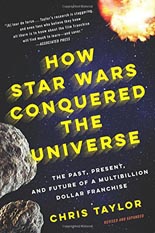
 Think back to the beginning of summer 1999, when Star Wars: Episode I — The Phantom Menace was about to hit the American multiplex with the fervor of an Ebola outbreak: In just one of untold marketing tie-ins, everyone from Anakin Skywalker and Mace Windu to (shudder) Jar Jar Binks adorned specially designed cans of Pepsi — a lot of cans of Pepsi.
Think back to the beginning of summer 1999, when Star Wars: Episode I — The Phantom Menace was about to hit the American multiplex with the fervor of an Ebola outbreak: In just one of untold marketing tie-ins, everyone from Anakin Skywalker and Mace Windu to (shudder) Jar Jar Binks adorned specially designed cans of Pepsi — a lot of cans of Pepsi.
So many, in fact, that there were more of those cans on the market “than there were people on the planet,” according to Chris Taylor, author of How Star Wars Conquered the Universe. I share that statistic to let you know Taylor isn’t fooling around with his book’s title. George Lucas’ little 1977 tribute to the beloved Flash Gordon serials of his youth was so unloved by its own studio that embarrassed 20th Century Fox execs considered the “kiddie” movie second fiddle to the Sidney Sheldon adaptation they just knew would be the season’s surefire smash.
As we now know, it wasn’t. Instead, Star Wars was the film to which moviegoers flocked, making it the hit by far (and far, far away). From legitimizing science fiction as a box-office draw to making a mint off something called action figures, cinema was never the same. Before The Force Awakens this Christmas, you owe it to yourself to read how it came to be and what all it has done.
Now available from Basic Books in a trade-paperback edition that’s been expanded and revised to include information on that upcoming J.J. Abrams film, How Star Wars Conquered the Universe is not a rehash of countless making-of narratives. Had Taylor just stuck to telling that story, the book still would be good, because the way he tells it is unlike any I’ve read before. While he harbors reverence for the original trilogy, he’s not beholden to fan worship/service; Lucas’ early drafts are, with evidence, rightly dismissed as “ponderous,” and Taylor is able to remain his journalist’s objectivity: “We tend to go overboard with hindsight when examining the history of something successful. We build creation myths out of the creation of myth. The creator himself … is often more than happy to help in this deception.”
Where this project really succeeds is, again, in keeping with the book’s title. In every other chapter, Taylor examines in depth the franchise’s penetration into — if not impregnation of — our pop-culture consciousness. It’s one that exists even within people who never have seen the movies, and the initial chapter finds the author attempting to find a Star Wars virgin. Other side routes introduce the reader to cosplay groups, the unwitting viral-video star known as the “Star Wars Kid,” the cottage industry of Del Rey novels, Jedi as a religion, taking lightsaber-duel classes, the Kenner action figures, the parodies (including Ernie Fosselius’ still-brilliant Hardware Wars), the rip-offs (including Luigi Cozzi’s still-hysterical Starcrash) and the or-all-the-wrong-reasons-immortal Star Wars Holiday Special.
Its sheer comprehensiveness and galaxy-wide scope make it a must for lovers of film and, in particular, the business of film. Star Wars fanatics might be put off by the occasional brusqueness; no better example exists than marketer Charlie Lippincott’s recollection of his then-unique strategy of spreading word and prepping the masses by saturating comic-book conventions: “What I did led to something I’m appalled at.” I don’t take such comments as a negatives.
But the errors, certainly. Although Taylor writes in his new introduction that this 2.0 version corrects the boo-boos of last year’s hardback, some big ones were missed. Referenced on seven pages, special-effects pioneer Douglas Trumbull (2001: A Space Odyssey) is misspelled as “Trumball” every single time, and twice, Playboy founder Hugh Hefner somehow acquires an extra “F” in his last name. More than once, you’ll find the book’s very subject listed as “Stars Wars” — a perfectly understandable typo, but one easily remedied by a find/replace search in your friendly desktop/laptop word-processing program of choice.
Maybe the third edition will see those mistakes fixed, because we know with certainly that even after Lucas’ retirement, the story of Star Wars is far from over. One suspects it’s only just begun. —Rod Lott
